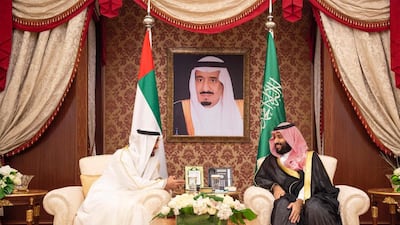Saudi Arabia, the UAE and Kuwait will hold meeting with Jordan in the holy city of Makkah on Sunday, in a show of Arab unity after Jordan was rocked by protests last week over a proposed tax increase.
The meeting was summoned by Saudi Arabia’s King Salman and will be attended by Jordan's King Abdullah II, Kuwaiti emir Sheikh Sabah Al Ahmad Al Jaber and Abu Dhabi Crown Prince Sheikh Mohammed bin Zayed, Deputy Supreme Commander of the Armed Forces.
The leaders will "discuss means of supporting Jordan to overcome its current crisis", the Saudi royal court said in a statement.
That likely means cash and support from the Arab nations to Jordan, which is experiencing an economic downturn. Rising unemployment has hurt Jordan's economy, as has taking in a large number of refugees from war-wracked Syria and Iraq.
King Abdullah replaced Hani Mulki as prime minister last week following widespread protests against a bill to increase income tax. The new prime minister Omar Al Razzaz, a former World Bank economist, has promised to scrap the legislation. Jordanians have welcomed the move but said they would wait to see if the new cabinet would stop price increases.
While Sunday’s meeting will seek ways to help Jordan through its economic crisis, there might be strings attached.
“The treasury is empty and the Gulf countries are keen to support Jordan with badly needed financial aid to help it stand on its feet,” said Imad Hmoud, an independent business analyst in Amman.
“But money does not come for free and Jordan might be asked to take a firm stance to support the Saudis in the deal of the century to end the Israeli-Palestinian conflict,” he continued. “The details are not clear, but Jordan’s role seems to be marginalised at a time when the Saudis are emerging as key players in the Middle East peace process.”
Jordan has one of the smallest economies in the Arab world. It imports about 90 per cent of its energy needs and grants have traditionally come from Gulf Cooperation Councilmembers Kuwait, Saudi and the UAE. In February this year, the United States, a close ally, pledged $6.38 billion in aid to the kingdom over the coming five years, which includes about $350 million in military aid.
The kingdom's debt to GDP ratio has risen to 94 per cent from 57 per cent in 2011, when a series of uprising shook the Arab world.
The meeting comes after the UAE's Minister of State for Foreign Affairs Dr Anwar Gargash told The National that the concerns facing the Arab world could only be dealt with by what he called a moderate "Arab centre", capable of dealing with a world that has become more turbulent and complicated than ever before.
"We have to be more responsible for our fate. But we cannot do it as the UAE alone. We do need to create an Arab centre," Dr Gargash said.
___________
Read more:
Jordan protests will continue says union leaders
Few easy options for Jordan’s incoming prime minister
Jordan's prime minister resigns
__________
The protests in Jordan, the largest since the 2011 uprisings, have caused concern in the Gulf states, according to experts. Any unrest could further destabilise the region and Jordan has for decades relied heavily on grants from oil-rich Gulf states to shore up its moribund economy.
“The demonstrations set off an alarm bell in the Gulf countries, particularly Saudi Arabia, who fret that they could undermine the stability of Jordan and expand to other countries,” said Zaid Nawaiseh, a political analyst in Amman. “Saudi Arabia also wants to support Jordan at a time there is increasing chatter in political circles about Jordan’s need to diversify its regional alliances to open up to Qatar and Iran, and this is against Saudi Arabia’s interests.”
“The Saudi king is following in the footsteps of King Abdullah bin Abdulaziz, who also supported Jordan during the 2011 uprisings,” he said, referring to the $5bn GCC fund established in 2011 to support development projects in Jordan. Qatar, although a GCC member, never contributed the fund.
Saudi Arabia has intervened before to help Jordan in times of crisis, but those days could soon be over if Amman does not get its house in order, observers say.
“While aid is crucial, the state has to realise that financial aid will not continue. Jordan has to adopt sound political and economic policies that would gradually limit its dependence on aid,” Mr Nawaiseh said.
For now, Mr Al Razzaz has managed to defuse public discontent when he announced that he will withdraw a proposed income law that expanded the base of taxpayers in Jordan.
This is not the first time leaders in the six-member GCC, which holds about a third of the world’s proven oil reserves, have come together to help each other or other Arab nations.
The GCC in March 2011 announced a $20bn aid package for Bahrain and Oman to support their struggling economies. Both members were both facing disquiet from youth and street protests on the back of high unemployment and subdued economic growth.
The Gulf countries again joined hands in pledging $12bn to help Egypt, the most populous Arab nation, after the country went through a second major political upheaval in 2013 with the removal of Mohamed Morsi’s government.

